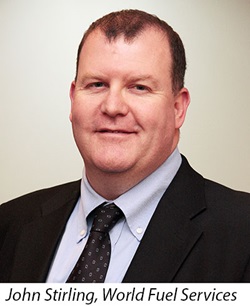World Fuel Services readies industry for critical 2020 decisions
The shipping industry is at various stages of preparation for the IMO’s sulphur cap on emissions scheduled to take effect on January 1, 2020. The change will be dramatic, forcing shipowners to reduce the sulphur content of the fuel they use to 0.50% from 3.50%
NYSE-listed World Fuel Services (WFS), who services marine, aviation and land businesses in more than 200 countries, says strong communication and durable partnerships will be needed among key sectors in the fuel supply industry if shipping is to adequately prepare and mobilise for the mandatory 2020 emission cuts.
John Stirling, Marine Quality Manager at WFS, says: “The most important message for the industry and our customers is that eventually you’ll have to make a choice and when you do, that choice will, for many, be critical.”
WFS says it appreciates this is a difficult time for the industry, with critical choices to be made and tough questions to be ask. Among them:
What will it cost to simply do nothing and continue to use gas oil?
What will the final cost of 0.50% VLSFO (Very Low Sulphur Fuel Oil) be to the buyer?
Is there an optimum time to invest in scrubbers?
Is LNG a viable fuel option for vessels other than LNG carriers?
Owners can consider other ‘cleaner’, niche, energy sources, such as methanol, ethanol, biofuels, solar power and fuel cells, but they won’t ‘fit’ for all ships. Of course, they will play their part in the overall energy mix, taking their piece of the solutions pie with some of the innovative, environmentally friendly fuel options already out there, gaining some momentum, but mostly in countries that offer some sort of financial assistance. Unlike the so-called ‘first movers’ and ‘innovators’, those who follow won’t necessarily get that help.
Another question asked is how will the FONAR (Fuel Oil Non-Availability Report) – currently in use in the U.S. when max 0.10% sulphur fuel is not available – become a workable global policy in the immediate post-2020 environment? Without clarity, there may well be chaos, as vessels seek elusive, compliant supplies.
Availability will depend, in part, on how many refineries will reconfigure to provide VLSFO to the marine trade which begs the question ‘do refineries need to ‘adapt’, to survive?’
A recent survey by Yokogawa consulting subsidiary KBC found that only 15% of the world’s fuel oil refineries had a strategy in place to meet the sulphur cap. They say fuel is likely to be available at major hub ports, where many of the world’s largest ships visit, but for vessels that call at isolated ports away from major trade lanes, availability of specific types of compliant fuel could be a concern.
The supply and demand equation will be critical to uninterrupted voyaging post-2020, so bunker suppliers and shipowners will need to ensure they have well made, resilient communication plans in place to fulfill each other’s requirements.
Owners and purchasers looking to ease the uncertainty around availability should seek to build their relationships at an early stage, leaning on reputable traders like WFS to fulfill their overall geographical bunker needs.
“It’s unfortunately a chicken and egg scenario, with the choice between ULSGO (Ultra Low Sulphur Gas Oil), LSGO (Low Sulphur Gas Oil), ULSFO (Ultra Low Sulphur Fuel Oil), VLSFO, scrubbers, LNG or any other compliant fuel being an extremely difficult choice. That difficult choice applies both for the supply side as well as the customer side.
“Make sure you spend money smartly. At some point, you’re going to have to invest, so make the best investment in time for the best gain. World Fuel Services have a physical presence in 17 locations and supplies in more than 1200 global sea ports, so we are an ideal partner to help our customers make the best decisions. And get it right first time;” Stirling says.
WFS has created an in-depth report for the industry: 2020 Vision: Preparing for the new global sulphur cap, available here

